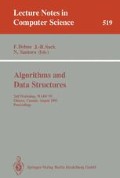Abstract
We present an algorithm to simulate Read-Modify-Write registers in a message passing system with unreliable asynchronous processors and asynchronous communication. The algorithm works correctly in the presence of a strong adversary that can stop up to T processors, or stop the delivery of their messages where T=[N/2]−1 and N is the number of processors in the system. This is the best resilience that can be achieved in the message passing systems. The high resilience of the algorithm is obtained by using randomized consensus algorithms and a robust communication primitive. The use of this primitive allows a processor to exchange local information with a majority of processors in a consistent way and therefore, make decisions safely. The simulator makes it possible to translate algorithms for the shared memory model to that for the message passing model. With some minor modifications the algorithm can be used to robustly simulate shared queues, shared stacks, etc.
This research was supported in part by the U. S Army Research Office under grant DAAL03-87-G-0004 and by the Information Science Research Institute, University of Nevada, Las Vegas.
Preview
Unable to display preview. Download preview PDF.
6 References
H. Attiya, A. Bar-Noy, and D. Dolev, Sharing Memory Robustly in Message passing systems. Proc. Ninth Annual ACM Symp. on Principles of Distributed Computing, Quebec City, Montreal, August 1990, 363–375.
A. Bar-Noy and D. Dolev, Shared Memory vs. Message-Passing in an Asynchronous Distributed environment. Proc. Eighth Annual ACM Symp. on Principles of Distributed Computing, Edmonton, Alberta, August 1989, 307–318.
B. Bloom, Constructing Two Writer Atomic Register. Proc. Sixth Annual ACM Symp. on Principles of Distributed Computing, Vancouver, B.C., August 1987, 249–259.
J. Burns and G. Peterson, Constructing Multireader Atomic Values from Non Atomic Values. Proc. Sixth Annual ACM Symp. on Principles of Distributed Computing, Vancouver, B.C., August 1987, 222–231.
J. Burns and G. Peterson, Concurrent Reading while Writing II: The Multiwriter Case. TR GIT-ICS-86/26, School of Information and Computer Science, Georgia Tech., December 1986.
B. Chor and L. Moscovici, Solvability in Asynchronous Environments, 30th Annual Symp. on Foundations of Computer Science, Research Triangle Park, North Carolina, Oct/Nov 1989, 422–427.
D. Dolev, C. Dwork, and L. Stockmeyer, On the Minimal Synchronism Needed for Distributed Consensus. Journal of the ACM, Vol 34, No 1, January 1987, 77–97.
M. Fisher, N. Lynch, and M. Paterson. Impossibility of distributed consensus with one faulty process. Journal of the ACM, Vol 32, No. 2, April 1985, 374–382.
A. Gottlieb, R. Grishman, C. Krustal, K. McAuliffe, L. Rudolph, and M. Snir. The NYU Ultracomputer-Designing an MIMD parallel computer. IEEE Transactions on Computers, Vol 32, No. 2, Feb. 1984, 175–189.
C.P. Kruskal, L. Rudolph, and M. Snir, Efficient Synchronization on Multiprocessors with Shared Memory. Proc. Fifth Annual ACM Symp. on Principles of Distributed Computing, Vancouver, B.C., August 1986, 218–227.
M. Herlihy, Impossibility and Universality Results for Wait-Free Synchronization. Proc. Seventh Annual ACM Symp. on Principles of Distributed Computing, Vancouver, B.C., August 1988, 276–290.
M. Herlihy and J. Wing. Axioms for Concurrent Systems. Proc. 14th ACM Symp. on Principles of Programming Languages, Jan 1987, pp 13–26.
L. Lamport, On Interprocess Communication Part I and II. Distributed Computing, Vol 1, 77–101, 1986.
R. Newmann-Wolfe, A Protocol for Wait-Free, Atomic Multireader Shared Variables. Proc. Sixth Annual ACM Symp. on Principles of Distributed Computing, Vancouver, B.C., August 1987, 232–247.
G. Peterson, Concurrent Reading while Writing. ACM Transactions on Programming Languages and Systems, Vol 5, No 1, January 1983, 46–55.
S. Plotkin, Sticky Bits and the Universality of Consensus. Proc. Eighth Annual ACM Symp. on Principles of Distributed Computing, Edmonton, Alberta, August 1989, 159–175.
A. Singh, J. Anderson, and M. Gouda, The Elusive Atomic Register. Technical Report TR 86.29, Department of Computer Science, University of Texas at Austin, December 1986.
A. Singh, J. Anderson, and M. Gouda, The Elusive Atomic Register Revisited. Technical Report TR 86.30, Department of Computer Science, University of Texas at Austin, December 1986.
Author information
Authors and Affiliations
Editor information
Rights and permissions
Copyright information
© 1991 Springer-Verlag Berlin Heidelberg
About this paper
Cite this paper
Aguilar, O.R., Datta, A.K., Ghosh, S. (1991). Sharing memory in asynchronous message passing systems. In: Dehne, F., Sack, JR., Santoro, N. (eds) Algorithms and Data Structures. WADS 1991. Lecture Notes in Computer Science, vol 519. Springer, Berlin, Heidelberg. https://doi.org/10.1007/BFb0028256
Download citation
DOI: https://doi.org/10.1007/BFb0028256
Published:
Publisher Name: Springer, Berlin, Heidelberg
Print ISBN: 978-3-540-54343-5
Online ISBN: 978-3-540-47566-8
eBook Packages: Springer Book Archive

